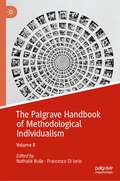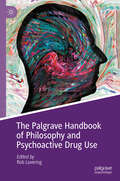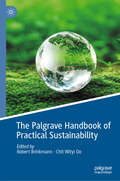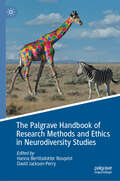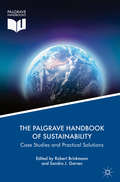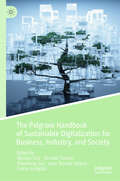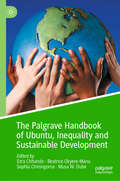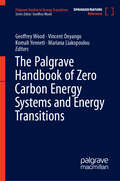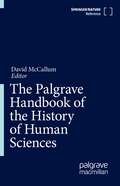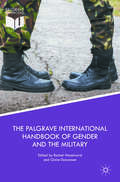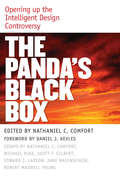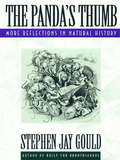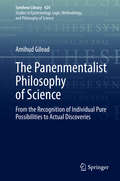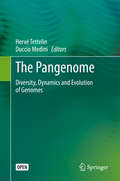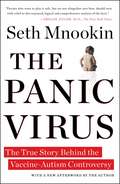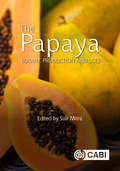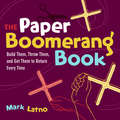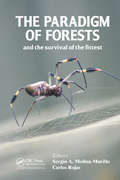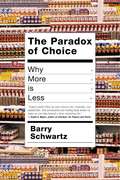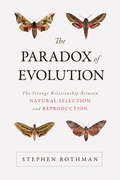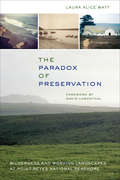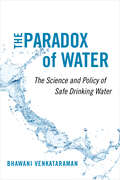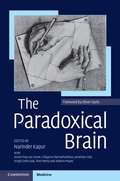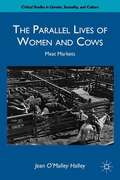- Table View
- List View
The Palgrave Handbook of Methodological Individualism: Volume II
by Francesco Di Iorio Nathalie BulleWhile methodological individualism is a fundamental approach within the social sciences, it is often misunderstood. This highlights the need for a discursive and up-to-date reference work analyzing this approach’s classic arguments and assumptions in the light of contemporary issues in sociology, economics and philosophy. This two-volume handbook presents the first comprehensive overview of methodological individualism. Chapters discuss historical and contemporary debates surrounding this central approach within the social sciences, as well as cutting edge developments related to the individualist tradition with philosophical and scientific implications. Bringing together multiple contributions from the world’s leading experts on this important tradition of theorizing, this collective endeavor provides teachers, researchers and students in sociology, economics, and philosophy with a reliable and critical understanding of the founding principles, key thinkers and intellectual development of MI since the late 19th century.
The Palgrave Handbook of Philosophy and Psychoactive Drug Use
by Rob LoveringIn this Handbook, philosophers from around the world address the metaphysics, epistemology, and value of psychoactive (mind-altering) drug use. In so doing, they attempt to answer questions such as: What does the fact of drug-induced mind-altering experiences tell us about natures of the mind, free will, and God? What does it tell us about what, and how, we can know? Are drug-induced mind-altering experiences valuable, morally, aesthetically, or otherwise? Is the acquisition of drug-induced mind-altering experiences ever immoral? Should the acquisition of drug-induced mind-altering experiences ever be legally prohibited? The Handbook gives an overview of the current research, and sets the stage for future directions in philosophical thought relating to psychoactive drug use.
The Palgrave Handbook of Practical Sustainability
by Robert Brinkmann Chit Wityi OoThis book provides a comprehensive look at practical sustainability around the world. The book takes a distinctly regional, case study perspective and highlights different approaches to managing sustainability challenges. Chapters by authors from all corners of the world look at a range of sustainability issues including environmental sustainability, environmental equity and justice, and government and business approaches to sustainability. The authorship of the book is distinctly global which provides an important perspective to this volume. Each chapter focuses on a different sustainability problem and how it was addressed in the region. Readers will take away a tremendous amount of information as to how sustainability challenges are addressed by leaders throughout the globe.
The Palgrave Handbook of Research Methods and Ethics in Neurodiversity Studies
by Hanna Bertilsdotter Rosqvist David Jackson-PerryThis timely volume brings together well-established scholars and emerging voices to explore research methods and ethics in Neurodiversity Studies. It explores the epistemic injustice that currently surrounds much knowledge production around neurodivergence, and offers concrete examples of creative, participatory, and collaborative research practice in the field. The editors have assembled chapters combining reflexive, theoretical, and practical contributions. Together they address current debates surrounding participatory methods and Neurodiversity Studies and are unique in giving voice to mainly neurodivergent researchers and contributors across autism, ADHD, acquired brain injury, and multiple neurodivergence. The first of its kind, this much-needed volume contains essential reading for all those learning and teaching in the field of neurodiversity. It further represents a valuable resource for students and academics at all levels, participatory or creative researchers, research commissioners, and research evidence users across the social sciences.
The Palgrave Handbook of Sustainability: Case Studies And Practical Solutions
by Robert Brinkmann Sandra J. GarrenThis book provides a comprehensive overview of the practice of sustainability through a diverse range of case studies spanning across varied fields and areas of expertise. It provides a clear indication as to the contemporary state of sustainability in a time faced by issues such as global climate change, challenges of environmental justice, economic globalization and environmental contamination. The Palgrave Handbook of Sustainability explores three broad themes: Environmental Sustainability, Social Sustainability and Economic Sustainability. The authors critically explore these themes and provide insight into their linkages with one another to demonstrate the substantial efforts currently underway to address the sustainability of our planet. This handbook is an important contribution to the best practises on sustainability, drawn from many different examples across the fields of engineering, geology, anthropology, sociology, biology, chemistry and religion.
The Palgrave Handbook of Sustainable Digitalization for Business, Industry, and Society
by Myriam Ertz Urvashi Tandon Shouheng Sun Joan Torrent-Sellens Emine SarigöllüThis handbook conceptualizes sustainable digitalization and discusses the role of digitalization in addressing business and societal challenges. Divided into eight sections, the book opens by an introductory chapter examining the theoretical foundations of the field. Part 1 explores the first dimension of sustainable digitalization, namely digitalization for sustainability (DFS) or how digitalization could address several of the sustainable development goals. Part 2 addresses the second dimension of sustainable digitalization. Titled responsible digital (RD), it covers the potential risks of increased digitalization and outlines strategies for governing digitalization for sustainable development to avoid the risks summarized earlier in the book. Tying digitalization to such topics as smart agriculture, industry 4.0, education, ecological transition, climate, clean water, food production, and social well-being, this handbook provides a framework for the emerging field of sustainable digitalization.
The Palgrave Handbook of Ubuntu, Inequality and Sustainable Development
by Musa W. Dube Ezra Chitando Sophia Chirongoma Beatrice Okyere-ManuThe Palgrave Handbook of Ubuntu, Inequality and Sustainable Development interrogates the multiple inequalities that subsist in the world and explores how Ubuntu, emerging from Africa but being potentially applicable elsewhere, holds promise for mitigation and resolution. It highlights inequalities that relate to gender, climate change, the environment, race, migration, and the struggle against poverty. It reflects on how and the extent to which Ubuntu can be a strategic resource in pursuit of equality and justice.
The Palgrave Handbook of Women and Science since 1660
by Alison E. Martin Claire G. Jones Alexis WolfThis handbook provides a comprehensive overview of core areas of investigation and theory relating to the history of women and science. Bringing together new research with syntheses of pivotal scholarship, the volume acknowledges and integrates history, theory and practice across a range of disciplines and periods. While the handbook’s primary focus is on women's experiences, chapters also reflect more broadly on gender, including issues of femininity and masculinity as related to scientific practice and representation. Spanning the period from the birth of modern science in the late seventeenth century to current challenges facing women in STEM, it takes a thematic and comparative approach to unpack the central issues relating to women in science across different regions and cultures. Topics covered include scientific networks; institutions and archives; cultures of science; science communication; and access and diversity. With its breadth of coverage, this handbook will be the go-to resource for undergraduates taking courses on the history and philosophy of science and gender history, while at the same time providing the foundation for more advanced scholars to undertake further historical and theoretical investigation.
The Palgrave Handbook of Zero Carbon Energy Systems and Energy Transitions (Palgrave Studies in Energy Transitions)
by Geoffrey Wood Vincent Onyango Komali Yenneti Mariana LiakopoulouThe Palgrave Handbook of Zero-Carbon Energy Systems and Energy Transitions provides a comprehensive and authoritative source of information, analysis and recommendations on the multi- and inter-disciplinary subject of zero carbon energy systems. The Handbook will advance thinking and research underlying the on-going energy transition by; covering a wide range of energy technologies and sources (e.g. fossil fuels, renewables, low carbon energy) including investigating the potential of new and alternative technologies and fuel sources and looking at the power, heating/cooling and transport sectors; Looking at varied legal jurisdictions and governance approaches including developing and developed countries and investigating potential new approaches to achieving a zero carbon energy system; Providing a broad range of theoretical and methodological approaches from a range of disciplines; Inclusion of a global range of case studies from Africa, Arctic, Asia, Australasia, Europe, the Middle East, the Americas (Central, North and South) and the Pacific, from the international, national, sub-national to city/community level.
The Palgrave Handbook of the History of Human Sciences
by David McCallumThe Palgrave Handbook of the History of Human Sciences offers a uniquely comprehensive and global overview of the evolution of ideas, concepts and policies within the human sciences. Drawn from histories of the social and psychological sciences, anthropology, the history and philosophy of science, and the history of ideas, this collection analyses the health and welfare of populations, evidence of the changing nature of our local communities, cities, societies or global movements, and studies the way our humanness or ‘human nature’ undergoes shifts because of broader technological shifts or patterns of living. This Handbook serves as an authoritative reference to a vast source of representative scholarly work in interdisciplinary fields, a means of understanding patterns of social change and the conduct of institutions, as well as the histories of these ‘ways of knowing’ probe the contexts, circumstances and conditions which underpin continuity and change in the way we count, analyse and understand ourselves in our different social worlds. It reflects a critical scholarly interest in both traditional and emerging concerns on the relations between the biological and social sciences, and between these and changes and continuities in societies and conducts, as 21st century research moves into new intellectual and geographic territories, more diverse fields and global problematics.
The Palgrave International Handbook of Gender and the Military
by Rachel Woodward Claire DuncansonThe Palgrave International Handbook of Gender and the Military provides a comprehensive overview of the multiple ways in which gender and militaries connect. International and multi-disciplinary in scope, this edited volume provides authoritative accounts of the many intersections through which militaries issues and military forces are shaped by gender. The chapters provide detailed accounts of key issues, informed by examples from original research in a wealth of different national contexts. This Handbook includes coverage of conceptual approaches to the study of gender and militaries, gender and the organisation of state military forces, gender as it pertains to military forces in action, transitions and transgressions within militaries, gender and non-state military forces, and gender in representations of military personnel and practices. With contributions from a range of both established and early career scholars, The Palgrave International Handbook of Gender and the Military is an essential guide to current debates on gender and contemporary military issues.
The Panda's Black Box: Opening up the Intelligent Design Controversy
by Edward J. Larson Michael Ruse Jane Maienschein Scott Gilbert Robert M. YoungThe debate over Intelligent Design seemingly represents an extension of the fundamental conflict between creationists and evolutionists. ID proponents, drawing on texts such as Darwin's Black Box and Of Pandas and People, urge schools to "teach the controversy" in biology class alongside evolution. The scientific mainstream has reacted with fury, branding Intelligent Design as pseudoscience and its advocates as religious fanatics.But stridency misses the point, argues Nathaniel Comfort. In The Panda's Black Box, Comfort joins five other leading public intellectuals—including Daniel Kevles and Pulitzer Prize winner Edward Larson—to explain the roots of the controversy and explore the intellectual, social, and cultural factors that continue to shape it.One of the few books on the ID issue that moves beyond mere name-calling and finger-pointing, The Panda's Black Box challenges assumptions on each side of the debate and engages both the appeal and dangers of Intelligent Design. This lively collection will appeal to anyone seeking a deeper understanding of what's really at stake in the debate over evolution.
The Panda's Thumb: More Reflections in Natural History
by Stephen Jay GouldWere dinosaurs really dumber than lizards? Why, after ?all, are roughly the same number of men and women born into the world? What led the famous Dr. Down to his theory of mongolism, and its racist residue? What do the panda's magical "thumb" and the sea turtle's perilous migration tell us about imperfections that prove the evolutionary rule? The wonders and mysteries of evolutionary biology are elegantly explored in these and other essays by the celebrated natural history writer Stephen Jay Gould.<P><P> Winner of the National Book Award
The Panenmentalist Philosophy of Science: From the Recognition of Individual Pure Possibilities to Actual Discoveries (Synthese Library #424)
by Amihud GileadThis book presents a philosophy of science, based on panenmentalism: an original modal metaphysics, which is realist about individual pure (non-actual) possibilities and rejects the notion of possible worlds. The book systematically constructs a new and novel way of understanding and explaining scientific progress, discoveries, and creativity. It demonstrates that a metaphysics of individual pure possibilities is indispensable for explaining and understanding mathematics and natural sciences. It examines the nature of individual pure possibilities, actualities, mind-dependent and mind-independent possibilities, as well as mathematical entities. It discusses in detail the singularity of each human being as a psychical possibility. It analyses striking scientific discoveries, and illustrates by means of examples of the usefulness and vitality of individual pure possibilities in the sciences.
The Pangenome: Diversity, Dynamics and Evolution of Genomes
by Hervé Tettelin Duccio MediniThis open access book offers the first comprehensive account of the pan-genome concept and its manifold implications. The realization that the genetic repertoire of a biological species always encompasses more than the genome of each individual is one of the earliest examples of big data in biology that opened biology to the unbounded. The study of genetic variation observed within a species challenges existing views and has profound consequences for our understanding of the fundamental mechanisms underpinning bacterial biology and evolution. The underlying rationale extends well beyond the initial prokaryotic focus to all kingdoms of life and evolves into similar concepts for metagenomes, phenomes and epigenomes. The book’s respective chapters address a range of topics, from the serendipitous emergence of the pan-genome concept and its impacts on the fields of microbiology, vaccinology and antimicrobial resistance, to the study of microbial communities, bioinformatic applications and mathematical models that tie in with complex systems and economic theory. Given its scope, the book will appeal to a broad readership interested in population dynamics, evolutionary biology and genomics.
The Panic Virus: A True Story of Medicine, Science, and Fear
by Seth MnookinWHO DECIDES WHICH FACTS ARE TRUE? In 1998 Andrew Wakefield, a British gastroenterologist with a history of self-promotion, published a paper with a shocking allegation: the measles-mumps-rubella vaccine might cause autism. The media seized hold of the story and, in the process, helped to launch one of the most devastating health scares ever. In the years to come Wakefield would be revealed as a profiteer in league with class-action lawyers, and he would eventually lose his medical license. Meanwhile one study after another failed to find any link between childhood vaccines and autism. Yet the myth that vaccines somehow cause developmental disorders lives on. Despite the lack of corroborating evidence, it has been popularized by media personalities such as Oprah Winfrey and Jenny McCarthy and legitimized by journalists who claim that they are just being fair to "both sides" of an issue about which there is little debate. Meanwhile millions of dollars have been diverted from potential breakthroughs in autism research, families have spent their savings on ineffective "miracle cures," and declining vaccination rates have led to outbreaks of deadly illnesses like Hib, measles, and whooping cough. Most tragic of all is the increasing number of children dying from vaccine-preventable diseases. In The Panic Virus Seth Mnookin draws on interviews with parents, public-health advocates, scientists, and anti-vaccine activists to tackle a fundamental question: How do we decide what the truth is? The fascinating answer helps explain everything from the persistence of conspiracy theories about 9/11 to the appeal of talk-show hosts who demand that President Obama "prove" he was born in America. The Panic Virus is a riveting and sometimes heart-breaking medical detective story that explores the limits of rational thought. It is the ultimate cautionary tale for our time.
The Papaya: Botany, Production and Uses (Botany, Production and Uses)
by Amalendu Ghosh Robert E Paull Víctor Galán Saúco Edward Evans Rebecca Ford S H Ahmad Christian Alcocer Fredy H Ballen Luis Barboza-Barquero Paul R Campbell A Chan Fure-Chyi Chen Nancy Jung Chen Ting-Chi Cheng Shih Wen Chin Rod Drew Franscisco Espadas Humberto Estrella João Paulo Fabi Gabriela Fuentes Amaranta Giron Julián Cuevas González Eric Guevara Marco V Gutiérrez-Soto Eudaldo Pérez Hernández Jian-Zhi Huang Víctor M Jiménez Chutchamas Kanchana-Udomkan Matiyar Rahaman Khan Chen-Yu Lee Wen-Li Lee Pauziah Muda M Munirah Usana Nantawan Eder Dutra Resende Jorge Manuel Santamaria-Fernandez S K Sharma N I Shukor N E Tajidin Carlos Talavera Lynton L Vawdrey Ziwei ZhouPapaya (Carica papaya) is an important and widely-cultivated tropical fruit, grown in more than 60 countries of the world. Global papaya production has grown significantly over the last few years, mainly as a result of increased production in India. Papaya has become an important agricultural export for developing countries where export revenues of the fruit provide a livelihood for thousands of people, especially in Asia and Latin America. This book includes coverage of recent research developments with the potential to improve crop yields and quality. New research has contributed to our understanding of the crop environment, plant growth and physiology of tree and fruit development with implications for both breeding and cultivation. It looks at how analysis of the papaya genome promises new, faster breeding techniques to improved cultivars and how these and other advances are helping to tackle disease like papaya ring spot viruses and major pests which cause significant losses. Key features include: updated information for sustainable papaya cultivation research developments in tackling the major production and post-harvest problems interdisciplinary and collaborative research With contributions from international experts, the book presents the current state of knowledge concerning the history, physiology, culture and marketing of papaya throughout the world. It is an essential resource for researchers, growers and all those involved in the papaya industry.
The Paper Boomerang Book: Build Them, Throw Them, and Get Them to Return Every Time (Science in Motion)
by Mark LatnoA detailed reference on the latest craze in lightweight aeronautics, this manual shows how to build and throw paper boomerangs. Techniques for mastering the basics will help beginners, while techniques for impressive throws--such as the behind-the-back toss; the boomerang juggle; the under-the-leg catch; and the dreaded double-handed, backward, double-boomerang throw--will thrill even the most advanced boomeranger. A history of the device and the physics behind its circuitous flight are also included, making this the only comprehensive reference on this fascinating toy.
The Paradigm of Forests and the Survival of the Fittest
by Sergio A. Molina-Murillo Carlos Rojas AlvaradoThis book demonstrates the social, historical, and environmental framework within which humans have developed a relationship with the forest and its resources. Starting from the biological basis that permits the existence of forests to the use of forest resources in a modern human context, this book summarizes the interaction between humans and forest ecosystems. Designed for readers from a broad range of disciplines and interests including those from environmental sciences, environmental economics, sociology, anthropology, biology, forestry and human ecology and other related disciplines, the book evokes interest in the development of an integrated approach towards forest ecosystems and natural resources in the context of sustainability.
The Paradox of Choice: Why More is Less
by Barry SchwartzA sociologist-psychologist studies the explosion of choices consumers face in western, particularly U.S., culture and the resulting stress and how individuals can respond.
The Paradox of Evolution
by Stephen RothmanThis book examines a little-noted contradiction inherent in the two essential elements of Darwin's theory of biological evolution--natural selection and reproduction. Physiologist Stephen Rothman makes the revolutionary claim that the evolution of life's complex and diverse reproductive mechanisms is not the consequence of natural selection. In so doing, he exposes the deepest question possible about life's nature--its reason for being.In meticulously detailed but accessible terms he lays out the crux of the paradox and offers an intriguing solution within a naturalistic framework. In an ostensibly purposeless universe, somehow purposeful life has evolved. For all living things there are two overarching purposes: survival and the creation of new life. Natural selection is about the survival of existing life, but has no interest in life's future, about whether it persists or perishes. By contrast, reproduction is only about the future of life, and has no interest in existing life except as a means to that end.Where do these purposes come from? As Rothman demonstrates, at every level life is wired to react to danger. Counterintuitively, without the danger to its existence, life would not have come into being. As for reproduction, nature's destructive forces drive the creation of new life.Written with great clarity and informed by deep learning, this elegant, thoughtful work tackles some of the most challenging questions raised by the theory of evolution, while calling to mind Darwin's famous words from the conclusion of On the Origin of Species: "There is a grandeur in this view of life."From the Trade Paperback edition.
The Paradox of Preservation: Wilderness and Working Landscapes at Point Reyes National Seashore
by Laura Alice WattPoint Reyes National Seashore has a long history as a working landscape, with dairy and beef ranching, fishing, and oyster farming; yet, since 1962 it has also been managed as a National Seashore. The Paradox of Preservation chronicles how national ideals about what a park "ought to be" have developed over time and what happens when these ideals are implemented by the National Park Service (NPS) in its efforts to preserve places that are also lived-in landscapes. Using the conflict surrounding the closure of the Drakes Bay Oyster Company, Laura Alice Watt examines how NPS management policies and processes for land use and protection do not always reflect the needs and values of local residents. Instead, the resulting landscapes produced by the NPS represent a series of compromises between use and protection--and between the area's historic pastoral character and a newer vision of wilderness. A fascinating and deeply researched book, The Paradox of Preservation will appeal to those studying environmental history, conservation, public lands, and cultural landscape management, and to those looking to learn more about the history of this dynamic California coastal region.
The Paradox of Water: The Science and Policy of Safe Drinking Water
by Bhawani VenkataramanWater is a molecular marvel. Its seemingly simple formula—H2O—dictates the properties that make water both essential for life and easily contaminated. Herein lies the paradox of water: we cannot live without it, but it is easily rendered "unsafe." The Paradox of Water explores the intersection of the scientific, social, and policy implications around access to safe drinking water. Drinking water is the smallest fraction of water used by a nation. Yet, the quality of this fraction is what dictates whether a community is healthy, educated, and economically sustained. Bhawani Venkataraman argues that a deeper understanding of the chemical nature of water is crucial to appreciating the challenges around access to safe drinking water. Drawing on recent research and case studies from the US and abroad, this book offers students an understanding of: the processes and oversight needed to ensure the safety of drinking water the role of the precautionary principle in managing drinking water potential solutions for expanding sustainable and equitable access to safe drinking water
The Paradoxical Brain
by Oliver Sacks Álvaro Pascual-Leone Tom Manly Andrew Mayes Jonathan Cole Sergio Della Sala Narinder Kapur Vilayanur RamachandranThe Paradoxical Brain focuses on a range of phenomena in clinical and cognitive neuroscience that are counter-intuitive and go against the grain of established thinking. The book covers a wide range of topics by leading researchers, including: * Superior performance after brain lesions or sensory loss * Return to normal function after a second brain lesion in neurological conditions * Paradoxical phenomena associated with human development * Examples where having one disease appears to prevent the occurrence of another disease * Situations where drugs with adverse effects on brain functioning may have beneficial effects in certain situations A better understanding of these interactions will lead to a better understanding of brain function and to the introduction of new therapeutic strategies. The book will be of interest to those working at the interface of brain and behaviour, including neuropsychologists, neurologists, psychiatrists and neuroscientists.
The Parallel Lives of Women and Cows: Meat Markets (Critical Studies in Gender, Sexuality, and Culture)
by Jean O’Malley HalleyWeaving together a social history of the American beef industry with her own account of growing up in the shadow of her grandfather's cattle business, Halley juxtaposes the two worlds and creates a link between the meat industry and her own experience of the formation of gender and sexuality through family violence.
